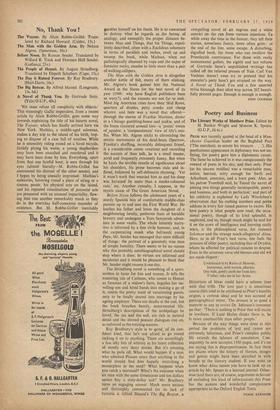No, Thank You!
The Voyeur. By Alain Robbe-Grillet. Trans- Algren. (Spearman, 16s.) Before Noon. By Ramon Sender. Translated by Willard R. Trask and Florence Hall Sender. (Gollancz, 21s.) The People of Hems& By August Strindberg.
Translated by Elspeth Schubert. (Cape, 15s.) The Day It Rained Forever. By Ray Bradbury.
(Hart-Davis, 16s.) A Novel of Thank You. By Gertrude Stein. (Yale /0.U.P., 40s.)
'WE must refuse all complicity with objects.' This stunningly Gallic imperative, from a recent article by Alain Robbe-Grillet, goes some way towards explaining the title of hi& bizarre novel, The Voyeur, which has finally arrived here via New York. Mathias, a middle-aged salesman, makes a day trip to the island of his birth, hop- ing to dispose of a case full of watches. While he is ostensibly riding round on a hired bicycle, futilely plying his wares, a young shepherdess may have been assaulted and murdered and it may have been done by him. Everything, apart from that one fateful hour, is seen through his eyes (almost literally—M. Robbe-Grillet has announced his distrust of the other senses), and I bp3an by being uneasily impressed : Mathias's memories, hovering round a piece of string or a cinema poster, his physical acts on the island, and his repeated visualisations of potential acts are presented with an unusual impartiality, flow- ing into one another remarkably much as they do in the everyday half-conscious maunder of existence. But M. Robbe-Grillet inevitably
garottes himself on his thesis. He is so concerned to destroy what he regards as the heresy of analogy, and exemplify the proper distance be- tween Man and Things, that his Things, repeti- tively described, often with a Euclidean solemnity in terms of parallels and inches, swell up and swamp the book, while Mathias, when not pathologically obsessed by rope and the napes of feminine necks, recedes to little more than a pair of walking callipers.
The Man with the Golden Arm is altogether another kettle of fish, many of them stinking. Mr. Algren's book gained him the National Award in the States for the best novel of its year (1949: why have English publishers been so wary?), and the reasons are not far to seek. Most big American cities have their Skid Rows, quarters of drunks, petty crooks and cheap whores; and here was a novel that offered— through the stories of Frankie Machine, dealer in a Chicago gambling-house and junkie, and of the bums clustered around him—a 'poetic' vision of squalor, a 'compassionate' view of life's mis- fits. When Mr. Algren sticks to chronicling the erratic movements of his dead-beats (Sparrow, Frankie's shuffling, incurably delinquent friend, is a considerable comic creation) and recording the accents of their talk, he is a small master, acrid and frequently extremely funny. But when he hauls the terrible mantle of significance about his shoulders, his prose becomes stale and in- flated, bolstered by self-defensive rhyming: 'Yet it wasn't work that wearied him so and his sleep was harassed by more than a smoke-coloured rain,' etc. Another casualty, I suppose, in the mystic cause of The Great American Novel.
Before Noon follows the adolescent years of a sturdy Spanish boy of comfortable middle-class parents up to and into the First World War. He loathes his father and loves the daughter of a neighbouring family, performs feats of heraldic bravery and undergoes a Tom Sawyerish adven- ture in some vaults. The whole leisurely narra- tive is informed by a fine virile humour, and, in the carpentering monk who befriends young Pepe, Mr. Sender has managed that most difficult of things: the portrait of a genuinely wise man of simple humility. There seems to be no reason why this probably autobiographical novel should stop where it does; its virtues are informal and incidental and it would be pleasant to think that Mr. Sender might resume it one day.
The Strindberg novel is something of a sport, written in haste for fun and money. It tells the roistering tale of Carlsson, who comes to Hemso as foreman of a widow's farm, beguiles her un- willing son and hired hands into making a go of it, courts the pretty maid of vacationing guests, only to be finally snared into marriage by his ageing employer. There are deaths at the end, but the book breathes bawdy, untormented life.. Strindberg's descriptions of the archipelago he loved, the sea and the soil, are rich in natural detail and the shrewd peasant dialogues run on, as unforced as the rotating seasons.
Ray Bradbury's style is so good, of its con- fident kind, that he's not afraid to go round tacking it on to anything. There are accordingly a few silly bits of whimsy in his latest collection of mostly very short stories. But it's amazing what he pulls off. What would happen if a man who admired Picasso more than anything in the world should find him happily scratching a masterpiece in the sand? What happens when you catch a mermaid? What's the outcome when six men with the same dimensions and ten dollars apiece buy a sixty-dollar suit? Mr. Bradbury turns an engaging answer. Much more serious and thoroughly commended for its jack of hysteria is Alfred Maund's The Big Boxcar, a compelling novel of six negroes and a white convict on the run from various injustices. To while away the time in the boxcar, they tell their stories, sometimes funny, more often grim : at the end of the line, some escape. A disturbing, dignified book, for those who can swallow the Priestleyish contrivance. For those with really monumental gullets, the eighth and last volume of Gertrude Stein's unpublished writings has rolled off the relieved presses of Yale. Carl Van Vechten doesn't even try to pretend that his executor's piety hasn't got strained on the way. A Novel of Thank You and a few assorted trivia hiccough their idiot way across 262 beauti- fully printed pages. Enough is enough is enough.
JOHN COLEMAN


































 Previous page
Previous page